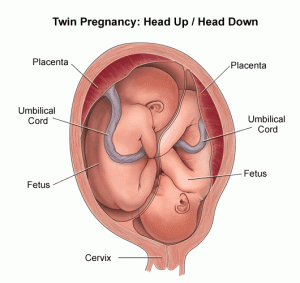
All You Need To Know About Multiple Pregnancies

The beauty of having a child is incomparable. From passionate love-making, the conception, and the processes that take place inside the woman’s body are some of the best parts of family life. It is always a blessing to carry and have a baby, more specifically, a fetus in the mother’s womb. But what if the blessing comes in twos, threes or fours? Here is everything you need to know about multifetal pregnancy?
COMPLICATIONS
 Premature Birth
Premature Birth

What is Premature Birth? It is a birth that is at least three weeks before the baby’s due date and is also known as preterm birth (less than 37 weeks—the full term is 40 weeks). The growth and development of the fetuses inside the womb happen in different phases.
While some premature babies show no signs of bad health, some can have health problems compared to fetuses born at full term. The health problems that could occur due to preterm birth are Jaundice, breathing problems, and longer hospital stays due to the baby’s need to be at the Neonatal Intensive Care Unit (NICU)
Doctors may decide to deliver babies early due to health concerns in case the mother has multiple fetuses. However, medical intervention should not be considered if there is no medical justification to do so. This is because the more premature the baby is, the more serious the potential health problems are likely to be. Most babies born prematurely are small, and preterm births make the most number of infant deaths.
 INTRAUTERINE GROWTH RESTRICTION
INTRAUTERINE GROWTH RESTRICTION
Intrauterine Growth Restriction (IUGR) is a condition in which the fetal weight that is 10% below the gestational age as determined by the ultrasound. It can also be called small-for-gestational-age or SGA. There are two types of IUGR, namely: Symmetric or primary and Asymmetric or secondary IUGR.
Symmetric or Primary IUGR occurs when all the internal organs of the fetus have a reduced in size. On the other hand, Asymmetric or secondary IUGR occurs when the head and brain are both normal, but the abdomen is smaller than usual. This is mostly seen until the third trimester.
 MEDICAL CARE
MEDICAL CARE
Neonatal medical care depends on general and specific conditions. Neonates need routine care for newborns while others require neonatal intensive care due to prematurity, low weight at birth, and delivery complications.
Obstetrical medical care is specific to multifetal pregnancy. The highest risk is in monochorionic or monoamniotic pregnancies. The high risks involve the possibility or preterm labor, hypertensive diseases, and intrauterine growth restriction (IUGR).
 CONSULTATIONS
CONSULTATIONS
There is a benefit when a woman with multiple gestations consults a perinatologist. A neonatologist may also be involved in the postnatal care of multiple birth infants, especially when there are prematurity and congenital anomalies.
 MEDICATION AND LABORATORY TESTS
MEDICATION AND LABORATORY TESTS
The medications vary depending on specific conditions or complications of the multiple birth infants.
Laboratory examination on multiple births suggests that the disorders or settings where the test helps to determine whether the twins or triplets (or more) are affected by a specific genetic anomaly. Compatibility testing for organ or bone marrow may be done.
 CARE FOR MULTIFETAL PREGNANCY
CARE FOR MULTIFETAL PREGNANCY

The fetuses inside the womb of the mother will share the nutrients that the mother has gained from foods and vitamins. In some cases, one of the fetuses may receive fewer nutrients than the others. This poses the risk of malnutrition, which is why there is a need to have a prenatal check-up.
 FOOD
FOOD
The mother should have a healthy diet to ensure the health of not only of the fetuses but herself as well. The right combination of vegetables and fruits, food supplements, vitamins prescribed by the doctor will be the key to a healthy pregnancy. The more green and leafy the vegetables, the greater the chances od having healthy newborns and the easier the labor will be. The mother should also be encouraged to take plenty of fluids.
 EXERCISE
EXERCISE
Due to the complexity of multifetal pregnancy, it is advised for the mother to consult a doctor on a regular basis. The physician should advise on the extent of strain the mother can tolerate. He or she can even adjust it according to the reaction of the mother to the activity.
More in Fitness
-
`
Is Swimming in Cold Water Good for You?
Swimming is a beloved activity that provides numerous physical and mental health benefits. Swimming can be a fantastic workout, whether you’re...
November 15, 2023 -
`
Unlocking the True Benefits of Detox Water
Detox water has taken the health and wellness world by storm, promising a wide range of benefits that go beyond ordinary...
November 7, 2023 -
`
How Tom Brady Shed 10 lbs After Retirement
One of the NFL’s most celebrated athletes, Tom Brady, has always been a topic of discussion. Brady never fails to surprise,...
November 1, 2023 -
`
AI’s Hidden Toll on Our Brains
Artificial Intelligence (AI) has permeated almost every facet of our lives, from virtual assistants and recommendation algorithms to autonomous vehicles and...
October 24, 2023 -
`
What to Drink During a Workout
When it comes to getting the most out of your workout, proper hydration is key. What you drink during exercise can...
October 17, 2023 -
`
Wearable Technology Applications in Healthcare
The world of healthcare is evolving at an unprecedented pace, and wearable technology is one of the driving forces behind this...
October 10, 2023 -
`
Initiating and Integrating Exercise in Daily Life
Incorporating exercise into our daily lives is essential for maintaining optimal health and well-being. However, initiating a fitness routine and seamlessly...
October 10, 2023 -
`
Jason Momoa’s Workout Routine for Iconic Aquaman Look
We all remember the moment: The big screen lights up, waves crash, and out emerges Jason Momoa as Aquaman, with his...
October 8, 2023 -
`
Crying: The Benefits on Mental Health
In a world that often champions stoicism and emotional restraint, shedding tears is sometimes dismissed as a sign of vulnerability. However,...
September 26, 2023















You must be logged in to post a comment Login